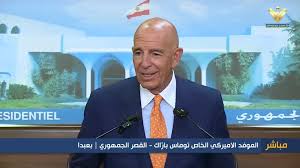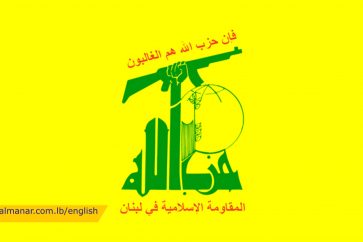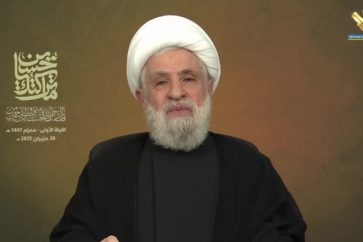The US Envoy Tom Barrack concluded on Wednesday a three-day mission in Lebanon, meeting with top officials, amid intense debates over cementing the November ceasefire implementation and advancing discussion of the national defense strategy.
Lebanese newspapers highlighted that Barrack firmly confirmed that there are no US guarantees to compel Israeli compliance, leaving discussions over Hezbollah’s armament as a sovereign Lebanese responsibility.
Yet Lebanon pushed back, insisting that any internal arms dialogue comes after immediate Israeli withdrawal and reconstruction assurances and, thus, demanding a package deal- no guarantees; no progress.
Ceasefire Implementation at the Forefront
During his meeting with Parliament Speaker Nabih Berri on Tuesday, Barrack emphasized that the US demands a durable, livable solution, not just a temporary truce, reassuring the Lebanese leaders that he came to help “address the failure of the ceasefire agreement,” claiming that both ‘Israel’ and Hezbollah are responsible for myriad violations.
Berri’s central move was to steer the conversation with the US envoy around the notion that the ceasefire is non-negotiable. In detailed briefings, Berri walked Barrack through events since Nov 27, listing Israeli violations and casualty statistics in Lebanon since then, challenging Barrack by asking: “Does Lebanon bear any responsibility for failing to uphold the ceasefire?”
As reported by Al-Akhbar, Barrack reaffirmed that the ceasefire remains on the table and emphasized the need for concrete steps toward its implementation, agreeing with Parliament Berri that continued Israeli raids and what is happening in Syria are obstacles to disarmament.
Addiyar also reported that Barrack shifted language by referring to Hezbollah outright as a “terrorist group”—a change that prompted senior Lebanese figures to question whether ‘Israel’ would now receive free rein in Lebanon
His meeting with Berri pushed Lebanese media to point out Barrack’s three key messages: classifying Hezbollah as a U.S.-designated terrorist group, believing the ceasefire has not been implemented, and warning that Washington cannot force ‘Israel’ to comply, rejecting Lebanese demand for explicit guarantees.
According to multiple sources who met Barrack, he considered his meeting with Berri the most critical from the moment he arrived in Beirut, and called Berri on Al Jadeed TV yesterday “a seasoned politician well-versed not only in Lebanese affairs but also in regional and global matters—even those of the United States”.
Al-Akhbar also highlighted Barracks description of his meeting with Berri as “excellent,” emphasizing the joint goal of reaching stability and encouraging hope.

Hezbollah’s Arms: A National Cause, not US Agenda
In a press briefing, Barrack emphasized that disarming Hezbollah is an internal Lebanese affair, and enforcement must come through Lebanese state institutions.
As reported by Al Akhbar, Barrack clarified that he is not acting as a negotiator but as a political intermediary, urging Lebanon to trust its military and legal frameworks to oversee any such processes.
On the other hand, Berri suggested that Barrack push ‘Israel’ to stop daily attacks and assassinations, and to withdraw, even if gradually, from occupied territories, which fosters an atmosphere of stability.
Such an atmosphere, Al Akhbar continues, would pave the way for an internal Lebanese dialogue on a national defense strategy, mainly addressing the question of resistance’s arsenal, which prompted Barrack to understand from Berri that, with no shift in the current situation, disarming the Resistance would be politically impossible.
In the Syrian context, Barrack informed Berri on Tuesday that he has arranged a meeting tomorrow, Thursday, in Paris, between delegations from both the Israeli and Syrian sides. The goal is to organize understandings on how to manage the security situation in southern Syria, including tSweida city.
Barrack’s goal during his third visit was clear: He wants Lebanon to follow the example of “Ahmad Al Sharaa’s Syria” by joining the “Abraham Accords”, under which Washington argues prosperity and regional progress can flourish, while Syria stands as a model Lebanon should take its cue from.
As Barrack wrapped up his mission, the tone across Lebanon’s leading newspapers reflected cautious optimism mixed with persistent skepticism, conveying that, while rhetoric may have softened, the core confrontation over ceasefire enforcement and the national defense strategy remains unresolved.
Source: Al-Manar English Website




